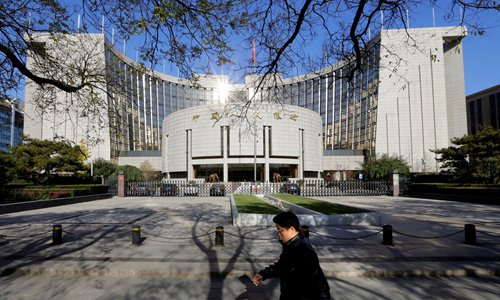HOME >> BUSINESS
Rising defaults in China's bond market normal and controllable: experts
By Zhang Hongpei Source:Global Times Published: 2019/7/31 20:53:40

A man walks past the headquarters of the People's Bank of China, the central bank, in Beijing File photo: VCG
Rising bond defaults in China are part of a normal process that helps the nation's debt sector become more market-driven by abandoning the practice of guaranteed payments, industry analysts said.
As of Tuesday, 47 Chinese companies defaulted on 54.89 billion yuan ($7.97 billion) involving 98 domestic bonds in 2019, figures from financial data provider Tonghuashun showed.
The real estate sector had the highest number of bond defaults.
The 16 HNA 02 bond, issued by domestic conglomerate HNA Group, defaulted on about 1.6 billion yuan on Monday, according to data from Tonghuashun.
There are concerns in the market about whether this year's bond defaults would break the record set in 2018, bringing more challenges to regulators and investors.
The record wave of corporate bond defaults last year hit 115.45 billion yuan last year involving 118 cases, while in 2017, the value was 33.75 billion yuan, according to another financial data provider Wind.
"It is hard to predict if the number of defaults will exceed that of 2018," said Dong Dengxin, director of the Financial Securities Institute at the Wuhan University of Science and Technology.
"As long as the defaults don't involve fraud or illegal economic behavior, but arise from problems with businesses' operations, they are a normal part of the capital market," Dong told the Global Times on Wednesday.
Domestic economic downward pressure and the uncertainties caused by the complex external environment have posed challenges to domestic companies, as shown in the bond market, experts said.
"But it is also a proper adjustment process when the nation's bond sector becomes more market-driven and guaranteed payments are abandoned," Liu Xuezhi, a senior economist at Bank of Communications, told the Global Times on Wednesday.
"Potential risks brought by the defaults are controllable if they do not expand to the point where they trigger systemic risks," Liu noted.
Pan Gongsheng, a deputy governor of the People's Bank of China (PBC), the country's central bank, said during the two sessions in March that defaults are normal. Defaults help break the system of guaranteed payments and correct faults in the market.
"They are beneficial for a normal investment culture, a normal price and resources allocation in the bond market," said Pan.
The official noted that China will control the amount of bond defaults in 2019, using both legal and market means.
Bond defaults increased last year, but were not excessively high, he said.
As of the end of 2018, defaulted bonds accounted for 0.79 percent of the total bonds issued, compared with the international level of between 1.12 percent and 2.15 percent in the past few years, Pan said, citing a Moody's report.
The PBC released in June a draft on trading of defaulted matured bonds in the interbank market with the goal of improving the trading mechanism and protecting investors' interests. It began a pilot program involving the trading of defaulted bonds on the interbank market in the second half of 2018.
China has sought in recent years to allow foreign investors wider access to the fast-growing domestic bond market, including encouraging issuance of panda bonds - yuan-denominated debt - by foreign entities in China.
As of the end of last year, China's bond market stood at 86 trillion yuan, ranking third in the world, with international investors holding 1.8 trillion yuan, up 46 percent year-on-year, Pan said in a high-level meeting in January.
In April, Bloomberg began adding yuan-denominated Chinese government and policy bank bonds to its Bloomberg Barclays Global Aggregate Bond Index.
Newspaper headline: Rising defaults in bond market normal and controllable: experts